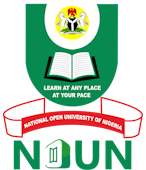
National Open University of Nigeria

The idea of an Open University for Nigeria was first muted by the National Universities Commission (NUC), the Nigerian government regulatory agency for all universities, in 1976. The NUC, then headed by Prof. Jubril Aminu as the Executive Secretary (1975-1979) sent a Memo to the Federal Military Government suggesting that an autonomous Open University be established for Nigeria during the Fourth National Development Plan (1981-1985). This was accepted by the Federal Government and subsequently, the idea made its appearance in the National Policy on Education in 1977. In Section Five Paragraphs 40, Sub-section A of the Policy, the Government declared that:
Maximum efforts will be made to enable those who can benefit from higher education to be given access to it. Such access may be through universities or correspondence courses, or open universities, or part-time and work-study programmes.
The Higher Education Division of the Federal Ministry of Education went to work on the process of creating an Open University and integrating it with the existing educational system in the country.
On assumption of leadership of Nigeria as the Civilian President in October 1979, Alhaji Shehu Shagari, immediately set up a Presidential Planning Committee on the Open University system to work out modalities for the establishment of an Open University for the country. Prof. Afolabi Ojo of the then University of Ife (now Obafemi Awolowo University, Ile-Ife) was appointed Chairman of the Committee on 14th April, 1980. Other members of the Committee included Prof. A.E. Afigbo (UNN, Nsukka) and Dr. Aminu Orayi (ABU, Zaria) and Mr. E.C. Uzodinma, who served as secretary but was later replaced by Mr. Olamogoke.
The Presidential Planning Committee presented its report in October 1980. The report which included the draft Bill for the University was approved. The Open University of Nigeria Bill, after passing through all the necessary official processes, which included change of name to National Open University, was finally ratified and signed into Law by President Shehu Shagari on 22nd July 1983 and was Gazetted on 27th July 1983, as the National Open University Act No. 6 of 1983, thus giving the University legal basis for its existence. It is this Law which governs the existence of the National Open University of Nigeria (NOUN) till today.
It is worthy of note that upon the establishment of the National Open University in 1983, the Government named Alhaji Aliyu Obaje, the Attah of Igala as the Chancellor; Alhaji Shuaibu Na’ibi, the Madakin Suleja as the Pro-Chancellor; Prof. Afolabi Ojo as the Vice-Chancellor and Alhaji H.A. Erubu as the Ag. Registrar.
However, it was sunset at dawn for the nascent university when unexpectedly, the Federal Military Government that succeeded the Civilian Government of Alhaji Shehu Shagari suspended the operation of the National Open University on 25th April, 1984.
The Resuscitation
But the compelling need for wider access to higher education for teeming Nigerians would not go away a decade and half after the suspension of the university, thus the idea of reviving the National Open University forcefully entered into the government political narrative with the coming of the Civilian Government headed by Chief Olusegun Obasanjo in 1999.
In 2002, the suspended National Open University Act of 1983 was reactivated, thus resuscitating the National Open University with Prof. Olugbemiro Jegede as the Vice-Chancellor. Prof. Jegede had earlier in 2001 been appointed as National Coordinator, National Open and Distance Education Programme by Chief Olusegun Obasanjo.
The National Open University of Nigeria (NOUN) as we have it today has become a leading ODL institution in Africa providing functional, flexible, accessible and cost-effective education for all who seek knowledge. It currently has 78 Study Centres spread across the six geo-political zones of the country. The current student population stands at over five hundred thousand.
As a faithful trustee of the Nigerian people, NOUN leverages on Information and Communication Technology (ICT) to deliver an education tailored towards the globalized economy. The University offers exceptional academic programmes that meet the specific needs of all sectors of the global economy, in the Arts; Health; Law; Physical, Social, Agricultural and Management Sciences.
As an ODL institution, NOUN is an equal opportunity university determined to meet the following objectives that necessitated the establishment of open and distance education in Nigeria:
Provision of Education for All and promotion of lifelong learning Filling the gap created by the closure of outreaches/satellite campuses Cost effectiveness Improved economies of scale Flexibility of delivery system Maximum utilization of academic personnel On-the-job teacher training Poverty eradication, vocational and lifelong education Provision of non-formal education Reaching the unreached Propagation of national orientation
Links
Displaying 1 article

